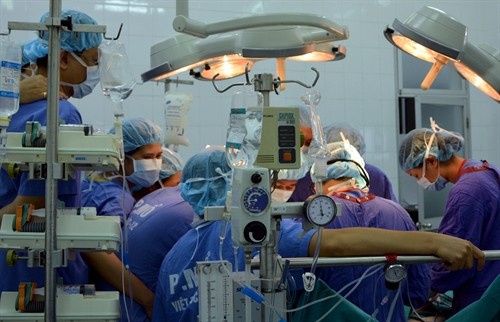Popular Reads
Top Results
Can't find what you're looking for?
View all search resultsPopular Reads
Top Results
Can't find what you're looking for?
View all search resultsVietnam seeks more organ donors as transplant demand rises
Change text size
Gift Premium Articles
to Anyone
About 10,000 patients in Vietnam with chronic kidney failure are waiting for transplants because of a shortage of donors.
Not long after receiving a kidney transplant four years ago, famous cai luong (reformed opera) singer Minh Vương was able to return to the stage to perform.
The kidney donation, which had come from a brain-dead patient, was a good match for Vuong, said doctors at Cho Ray Hospital, where the surgery was performed.
Prior to the operation, Vuong had dialysis three times a week for several months, and could only perform infrequently.
“I’m very lucky because I didn’t have to wait for a long time to find a donor whose kidney matched mine. The donor’s O blood type was the same as mine. My health now is good and I can stand on stage even longer than before,” Vuong said.
Many others are not as fortunate. About 10,000 patients with chronic kidney failure are waiting for transplants because of a shortage of donors.
Around 21,000 people each year die due to hepatitis B and C as well as liver cancer.
Pham Thi Ngoc Thao, the deputy head of Cho Ray Hospital, said that it was difficult to source organs from donors, particularly from people who are still alive.
The hospital, however, has found more sources of organs, including non-heart beating donors who have had cardiac arrest, as well as are brain-dead patients, Thao said.
“We began communicating more about the need to donate organs after death, and we also asked the government to set up a legal framework to approve organ transplants from brain-dead donors,” she added.
At a recent ceremony on the 100th kidney transplant held at People Hospital 115 in Ho Chi Minh (HCM) City, Prof Pham Gia Khanh of Military Medical Academy, said that the law issued in 2006 offered more opportunities for organ transplants in the country.
Cho Ray Hospital was the first to have a successful kidney transplant from a brain-dead donor in February, 2010.
Other hospitals followed. Doctors at Vietnam-German Hospital in Hanoi, for instance, conducted a liver transplant operation with an organ from a brain-dead person three months after Cho Ray Hospital’s first kidney transplant.
One month later, the Military Medical Academy performed the country’s first heart transplant.
Since then, the hospitals have conducted many transplant surgeries.
“Organ transplants in the country have become common, with an increasing number of cases,” he added.
Around 1,300 transplant operations, with kidney, liver, heart and pancreas, have been conducted between 2010 and 2015, four times higher than in the previous 17 years.
A coordination center for organ transplants set up at the Vietnam-German Hospital helps doctors find information about organ sources from centers around the country.
For instance, via the center, the Vietnam-German Hospital was aware that Cho Ray Hospital had an available heart and liver from a brain-dead patient.
The two hospitals worked closely to remove the heart and liver from the patient and then revive and preserve the organs.
The organs were immediately sent by plane from HCM City to Hanoi’s Vietnam-German Hospital. The operations on two patients were conducted in September 2015.
Despite these successes, the number of organs donated from brain-dead patients remains very low, about 50, according to hospitals.
Du Thi Ngoc Thu, head of the Cho Ray Hospital’s Organ Transplant Co-ordination Ward, said the hospital had about 50 brain-dead patients each week, but most of the family members had refused to donate their organs because of traditional custom.
Khanh of the Military Medical Academy urged the government and media to carry out more campaigns to encourage the public to donate their organs after death.
More policies and certain allowances for donors should also be issued, he added.
Although costs for transplant surgery are lower than in other countries, health insurance coverage for transplant surgery is often limited. He said that poor patients could not often afford the surgery.
Nguyen Truong Son, head of Cho Ray Hospital, said that organ transplants required advanced equipment and highly qualified doctors.
With the passage of the organ donor law and the increasing level of expertise of doctors, the number of surgeries has risen. But the hospital is faced with a staff shortage.
“If there is one transplant a month, we could do it. But if the number of donated organs increases and transplant operations are performed every two or three days, we will not have enough staff,” Sơn said.







